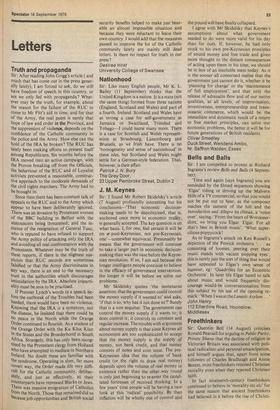J. M. Keynes
Sir: I found Mr Robert Skidelsky's article (7 August) profoundly interesting but his conclusions—`That economic decisionmaking needs to be depoliticised, that is, anchored once more in economic reality, is generally accepted. The key question is on what basis. I, for one, feel certain it will be on a. post-Keynesian, not pre-Keynesian, one'—somewhat equivocal. Presumably he means that the government will continue to take a larger part in economic decisionmaking than was the case before the Keynesian revolution. If so, I am sad because the longer intelligent people continue to believe in the efficacy of government intervention, the longer it will be before we solve our problems.
Mr Skidelsky quotes 'the monetarist assertion, that the government could control the money supply if it wanted to' and asks, `if that is so, why has it not done so?' Surely that is a non sequitur. The government can control the money supply if it wants to; it does control it ; it controls its constant and regular increase. The trouble with arguments about money supply is that since Keynes all economists are too sophisticated to accept that the money supply is the supply of money, not bank credit, and that money consists of notes and coin issue. The preKeynesian idea that the volume of bank credit (or the right to draw real money) depends upon the volume of real money in existence rather than the other way round is only just beginning to re-enter the castellated fortresses of received thinking. In a few years' time people will be having a new look at this 'radical' possibility. By then inflation will be wholly out of control and
the pound will have finally collapsed.
1 agree with Mr Skidelsky that Keynes's assumptions about what government needed to do were more valid for his day than for ours. If, however, he had only stuck to his own pre-Keynesian principles of sound money and free trade and given more thought to the distant consequences of acting upon them in his time, we should be in less of an insoluble mess today. As it is the sooner all concerned realise that the government just cannot do it, whether it be 'planning for change' or the 'maintenance of full employment', and that only the release of adrenalin flow and of our native qualities, at all levels, of improvisation, inventiveness, entrepreneurship and transoceanic commerce, which would be the immediate and automatic result of a return to free market principles, can solve our economic problems, the better it will be for future generations of British residents. Oliver Smedley Duck Street, Wendens Ambo,
Nr. Saffron Walden, Essex





































 Previous page
Previous page